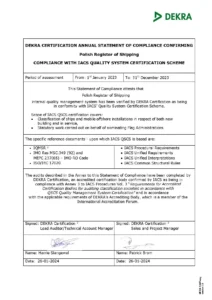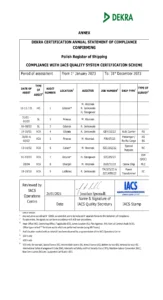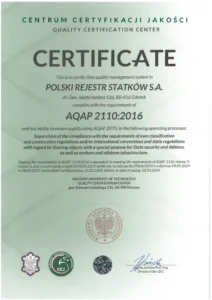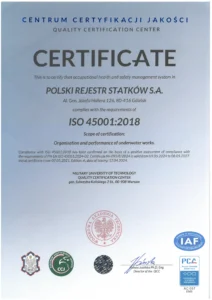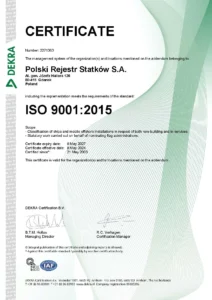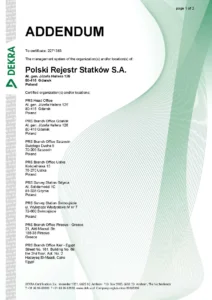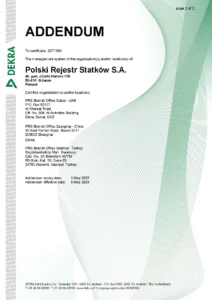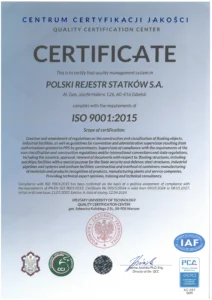Polish Register of Shipping (PRS) is an independent, world-recognized appraisal institution with 90 years of tradition on the market, a member of the elite International Association of Classification Societies (IACS).
We are one of the few Polish institutions whose activities are regulated by law and are of a public utility nature.
Values and mission
To be the first choice partner for state administrations, insurers and companies that need support with the highest standards in ensuring the safety of people, floating and land objects, cargo and the natural environment.
By formulating requirements, supervising and issuing appropriate documents, we support activities in every industrial, economic and social sector and help our clients build innovative and novel solutions that guarantee safe operation..
Basis of activity
Polish Register of Shipping is a member of the International Association of Classification Societies (IACS).
The current list of IACS member societies is available here.
Polish Register of Shipping is an organisation recognized by the European Parliament and the Council under:
Regulation (EC) No 391/2009 of the European Parliament and of the Council of 23 April 2009 on common rules and standards for ship inspection and survey organisations.
Commission Decision No 2009/728/EC of 30 September 2009 extending the Community recognition of the Polish Register of Shipping adopted inline with the above Regulation and announced in the Official Journal of the European Union No L 258/34 on 1 October 2009, states that Polish Register of Shipping was granted the extended 2006 Community recognition with effect from 29 September 2009. The Decision of the European Parliament and of the Council contains no limitations and covers ships subject to international conventions of all types and size in all trades.
Directive 2006/87/EC of the European Parliament and of the Council laying down technical requirements for inland waterway vessels.
On 2 February 2012, the European Commission issued a Commission Implementing Decision 2012/66/EU on the recognition of the Polski Rejestr Statków S.A. as a classification society for inland waterway vessels, stating the Society’s conformity with criteria given in Directive 2006/87/EC. PRS may thus operate as a recognised organisation for floating units throughout the Community inland waterway network. This Commission Decision was addressed to the Member States that have inland waterways. Recognition means that PRS performed technical inspections and documents issued provide grounds for state administrations to recognise the compliance of the vessel with the requirements of Directive 2006/87/EC and to issue relevant certificates.
Scope of certification and accreditation
Polski Rejestr Statków S.A. activity is covered by the certification for conformity with the requirements of ISO 9001:2015 Standard – Quality management systems – Requirements, in the following areas:
a) development and updating of the rules for classification and construction of floating objects, industrial objects as well as statutory and administration survey guidelines resulting from authorizations granted to PRS by Governments;
b) performing surveys for compliance with the requirements of the Society’s own Rules for classification and construction and/or the requirements of the relevant international conventions as well as national regulations regarding the following: floating objects, including naval craft; special purpose objects intended for the State security and defence; construction of steel structures, pipelines and industrial installations, as well as land objects; construction and repair of containers; manufacture of materials and products; approval of products, manufacturers and service suppliers;
c) provision of technical expertise, training courses and advisory services.
Moreover, PRS activity is covered by the certification for conformity with the requirements of IACS – Quality management system requirements (IQMSR), in the scope of:
Classification of ships and mobile offshore installations in respect of both new building and in service. Statutory work carried out on behalf of nominating flag Administrations.
PRS activity is covered by the certification for conformity with the requirements of NATO publication AQAP 2110:2016 – NATO Quality assurance requirements for inspection and test:
performing surveys for compliance with the requirements of the Society’s own Rules for classification and construction and/or the requirements of the relevant international conventions as well as national regulations regarding the following: floating objects intended for the State security and defence, offshore and coastal infrastructure.
PRS HISTORY
The concept of establishing a Polish classification institution was originally voiced in 1932 in response to the difficulties raised by German institutions for the Polish inland waterway fleet. The problems encountered in buying out insurance cover, above all by barges transporting cargo between the ports of Gdynia and Free City of Gdańsk, resulted in establishing four years later the Polish Register of Inland Shipping.
In the early years up to the outbreak of World War II, the Polish classification institution was engaged exclusively in the supervision of barges and cargo vessels sailing Polish rivers and the Gdańsk Bay. The only rules developed and published in those times were “Classification and construction of wooden and steel barges”.
Reviving its activity after the war, the institution’s name was changed to Polski Rejestr Statków, which was not a formal change only – it defined the new tasks for the Society connected with Poland regaining access to 500 km of the Baltic Sea coast.
In the first years following the war, up to the year 1950, PRS supervised inland waterway vessels, the coastal fleet, fishing cutters – mainly repairs and overhauls performed by Polish shipyards. In 1950 the construction of the first sea-going ships came under PRS’ supervision. A series of 29 small bulk carriers, 660 GT and 4000 GT for ore-and-coal, general cargo carriers, fishing super trawlers and tugs were built in Gdańsk Shipyard.
At the same time PRS starts supervising production for the shipping industry: hull steel manufacture (starting 1949), ship equipment and devices i.e. boilers, steam engines, exhaust-steam turbines, later diesel engines and small and high-power generators.
The scope and the volume of PRS activity grows together with the development of the Polish shipping industry and the growing number of more sophisticated ships built in Polish shipyards. Nevertheless, prior to the agreement on cooperation and mutual representation between PRS and Det Norske Veritas, and the USSR Register of Shipping in 1956-57, PRS supervises solely ships flying the Polish flag or those built in Polish shipyards for Polish ship owners.
The international agreements resulted in gradual opening of the world to PRS, and consequently growing quality of PRS services. The expanded area of activity and close cooperation with experienced classification societies allow PRS to, inter alia, start the process of developing its own rules for the construction and classification of sea-going ships. The first volumes of the rules were published in the early 60s and are continually upgraded up to date.
Membership in the Institution for Technical Supervision and Classification – an organization associating classification institutions of the Council for Mutual Economic Assistance (Comecon) in 1962, contributed to the development and upgrading of PRS rules.
In the early 60s up to of mid-70s the 20th century the Polish maritime industry starts experiencing “the golden years”. The decade was the time of dynamic development with rapid quantitative and qualitative progress. In Gdańsk and Gdynia shipyards alone PRS supervised 25-27 ships annually built under PRS class, not to mention those built in other marine and river shipyards.
In 1961 Poland developed legal regulations concerning sea shipping. On 1 December 1962 the Polish Parliament adopted the Maritime Code with a vast number of implementing regulations. The safety of sea-going ships was regulated by the directive of the Ministry for Shipping dated 26 March 1964, where PRS rules were indicated as obligatory in terms of technical safety for Polish flag sea-going ships. In effect, PRS rules were granted the status of national law. PRS enjoyed the status of the national classification institution and consequently supervised almost the entire Polish sea-going and inland waterways fleets.
Accession to the International Association of Classification Societies (IACS) in 1970 marked another milestone in the history of PRS. Starting 1971 PRS was included in London Underwriters’ insurance clause, which made the most favorable insurance premiums applicable to ships classed by PRS and shipped cargo. Within IACS structures PRS participated in the development and research works of associated societies, gained access to R&D results and state-of-art supervision methods. Membership in IACS and participation in the activity of a number of prestigious international organizations such as CIMAC (International Council on Combustion Engines), ISO (International Organization for Standardization), IEC (International Electrotechnical Commission), IIW (International Institute of Welding), ISSC (International Ship and Offshore Structures Congress) accelerated PRS development. PRS presence in the world market showed a growing number of ships flying other than the Polish flag with PRS class, and new branch offices abroad, e.g. in Copenhagen, Antwerp, New York.
PRS operations expand in the 70s to new areas: construction and operation of containers, mobile offshore drilling units, submersibles, and yachting.
The worldwide boom in shipping and ship industries was brought to a halt in 1975. In 1979 the globally launched tonnage was 3 times smaller than in the peak year of 1975. At the beginning of the eighties ship production revived but remained vacillating up to 90s when the sector’s situation improved in the global economy.
The situation in Polish shipping industry in those years suffered similar plight in the times of global regress and was further underpinned with growing chaos in Polish economy since the mid 70s. The Polish shipping industry, deteriorating with the failing Polish economy and the diminishing Polish fleet, could not leave PRS unaffected. PRS generally supervised the construction and classification of ships for Polish ship owners. To maintain both quantitative and qualitative operational levels PRS had to attract more ships of other than Polish owners and enter into new areas of activity.
Throughout the 90s, following the political and economic transformation in Poland, PRS steadily increased the number of ships classed flying non-Polish flags, and by the end of the decade almost half of the sea-going fleet classed by PRS belonged to non-Polish owners. Concurrently, steps were made to expand services, as in other renowned classification societies, to provide supervision for construction of motorways, industrial objects, construction and operation of power transfer and distribution installations, etc., and certification of quality systems. The vast engineering knowledge and experience of PRS found application in other economic sectors, not only in the shipping industry.
PRS continues to develop its non-marine sector extending the range of provided services. Successful construction supervision, ending in 2006, of a section of the pipeline Jamal – Western Europe that included 5 pumping stations proved the competence of PRS engineering staff. Another project worth mentioning was PRS supervision of A-1 motorway construction in cooperation with a British company.
The strongly competitive international market and rapid increase in classified tonnage brought both benefits and problems for PRS. Fierce competition led to PRS exclusion from IACS in 2000. In spite of this, PRS held its market share adjusting the range and structure of the offered services to the ever-changing market conditions. The network of domestic branch offices remained the same with a growing number of offices abroad. Offices in various locations worldwide and delegated exclusive surveyors ensured efficient survey performance irrespective of their location.
The nineties also marked close cooperation of PRS with the Polish Navy and the development of classification rules for navy ships and experience in newbuilding supervision.
At the beginning of 1994, PRS was granted the IACS quality certificate and in 1997 the Polish Certification and Testing Centre (PCBC) issued a quality certificate to the Society. Soon afterwards, PRS provides certification of quality management systems, environmental and occupation safety systems in other companies holding the accreditation of the then relevant Polish Certification and Testing Centre Polish and today the Polish Accreditation Centre (PCA). Many leading Polish companies and institutions like the biggest shipyards in Gdynia, Gdańsk, Szczecin and Świnoujście and state administration offices chose PRS certification services. Over the years the range of certification services increased and the number of organizations certified by PRS grew. By the end of 1995 PRS listed issue of 14 certificates, and ten years later provided services to more than 1500 entities.
PRS also provides certification services for conformity with EU directives as an EU notified body to assess conformity and certify against EU technical directives. PRS is accredited by Polish Centre for Accreditation (Accreditation Certificate No AC 114), which confirms conformity with the requirements of PN-EN 45011:2000 (EN 45011:1998. IDT) and authorizes certification of products covered by the accreditation. The Society was notified by the Polish Government in the European Commission to perform assessment of compliance with new and global approach directives and performs voluntary assessment and certifications of products. At present PRS is a notified body to assess compliance and certify products for compliance with seven directives, including the Marine Equipment Directive.
Polish Register of Shipping is among the few Polish institutions that operate under a special Parliamentary Act, adopted in 2000, stating that Polish Register of Shipping is a classification institution of a non for profit nature, providing sound grounds and positioning in the Polish legal system.
Other milestones in recent PRS history were the EU recognition of the Society in 2006 as conforming to the requirements of the Directive 94/57/EC of 22 Nov 1994 on common rules and standards for ship inspections and surveys and readmission to the International Association of Classification Societies (IACS) in June 2011. Since 2009 the recognition by European Union has no restrictions covering ships of all types and sizes subject to international conventions, operating in any conditions.
On 2 February 2012, the European Commission issued a Commission Implementing Decision 2012/66/EU on the recognition of the Polski Rejestr Statków S.A. as a classification society for inland waterway vessels, stating the Society’s conformity with criteria given in Directive 2006/87/EC. PRS may thus operate as a recognised organisation for floating units throughout the Community inland waterway network.
This Commission Decision was addressed to the Member States that have inland waterways.
Recognition means that PRS performed technical inspections and documents issued provide grounds for state administrations to recognise the compliance of the vessel with the requirements of Directive 2006/87/EC and to issue Community inland navigation and admeasurements certificates.
Development of Rules ensuring technical safety at sea is the essence giving grounds for operation of a classification society. These continuously upgraded Rules comprise technical requirements for construction and operation of ships entailing the need to conduct research and development activities. Polish Register of Shipping pursues studies in-house and cooperates with Polish technical universities, maritime universities, science centres, shipyards and design offices. Wide ranging and fruitful cooperation of PRS with the Faculty of Ocean Engineering and Ship Technology of Gdańsk University of Technology, Ship Design and Research Centre in Gdańsk, Institute of Welding in Gliwice, Naval Academy in Gdynia as well as the Merchant Marine Academies in Gdynia, in Szczecin and with Szczecin University of Technology remain a good tradition.
PRS is involved in the process of developing standards for ship structural safety, actively participates in the work of the IMO Maritime Safety Committee (MSC) putting forward a new approach and novel methods of solving structural safety problem.
Polish Register of Shipping plays a special role in Polish maritime economy not only directly by ensuring technical safety of vessels but by linking science and industry and integrating the maritime sector. This special and leading role was recognised as early as in 1968, when the Minister of Shipping entrusted PRS with running the secretariat and all issues related to Polish membership in IMO, which is continued to this day. PRS structure incorporated Centre for IMO Affairs – national secretariat coordinating all activities resulting from Poland’s membership in the most important global maritime organization.
Though PRS is involved in several areas of business services the ensuring of safe shipping and protection of the environment continue to remain in the forefront.
